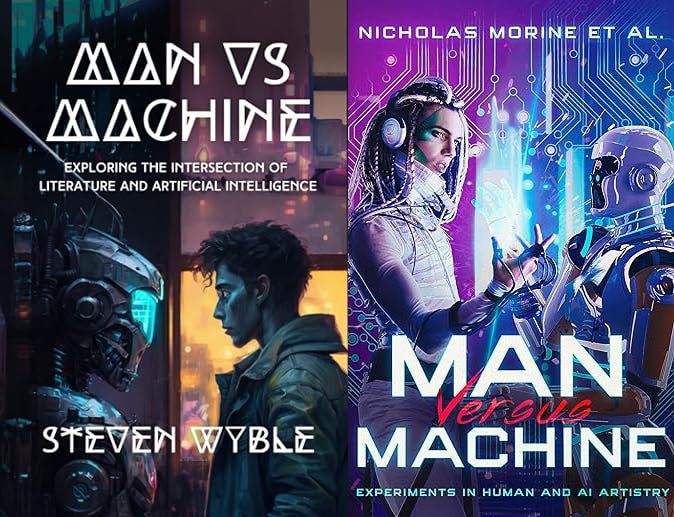Someone stole my book (allegedly)
On the blurry line between inspiration and infringement in the age of AI
I found out recently that someone stole my book.
OK, I’m being a little hyperbolic, but not much: I suspect someone stole the concept for my book Man vs Machine. There’s always the possibility this was a case of parallel thinking, although I personally doubt that’s the case. (I’m very open to being corrected if I’m wrong, however). Not only did this book seemingly copy the concept of my book, it appears to have cribbed the title, too. The cover is also suspiciously similar to mine: Both feature a human and a robot facing off against each other.1

I published Man vs Machine: Exploring the intersection of literature and artificial intelligence in April of this year. Nicholas Morine’s Man Versus Machine: Experiments in Human and AI Artistry was published three months later, in July.
The concept of my book is simple: I wrote 10 short stories, and I used AI chatbots to create 10 more. The reader’s task after reading each story is to guess whether it was written by a human, or by AI. The concept of Morine’s book is exactly the same.
I wrote this book because I was interested in publishing something using AI, but it didn’t feel right to publish a book that was completely AI-generated and slap my name on it. For one thing, it would be unclear if I could even call such a book my own; a recent court ruling declared works created by AI without human input ineligible for copyright protection. But I believed I’d found the perfect solution by combining my writing with AI writing and adding the interactive element of requiring the reader to guess which is which. At the time I published my book, I did my due diligence to see if anyone had published a book with a similar concept. I couldn’t find one, and believed I’d stumbled upon a fairly original concept. I was proud of it. It seems I’d come up with the idea of testing the ability to distinguish between human and AI writing even before researchers did.
That said, I’m realistic. You can’t copyright an idea, nor a title (and I admit “man vs machine” is a fairly common phrase). I doubt Morine’s (alleged) copying of my book violates the law, and even if it did, I’m not litigious. I think it’s a good thing to see what these new AI tools can accomplish in the realm of literature and anyone contributing to that work is welcome.
What irks me is just how closely Morine appears to have copied multiple elements of my book without acknowledging that my work was the inspiration for his. Further, it leaves open the possibility that someone could mistakenly think that I copied him. Indeed, one of the Amazon reviews for Morine’s book declares that it’s “Unlike Any Other Book.” I’d say it’s a bit like the nearly identical book that preceded its publication by three months! I’ll give Morine some credit, however. Whereas my book solely contains short stories, he expanded the repertoire of AI writing to include poetry, recipes, song lyrics, etc. Morine also included works by other authors in his collection, which adds to the challenge of determining each story’s authorship.
Critics of generative AI will doubtlessly pick up on some irony here. One of the main criticisms of AI-generated writing and artwork is that they “steal” from the authors or artists they were trained on. (I touched on this briefly in a post I published shortly after the publication of Man vs Machine). This criticism has been in the news recently, as Sarah Silverman and other writers sued OpenAI for training ChatGPT on their works. So I could easily see a critic laughing at my consternation over someone seemingly stealing my idea. Ha! You care about your book getting stolen, but you don’t care enough about the countless authors and artists whose work was stolen by OpenAI and Midjourney to refrain from using AI-generated content in your book! Karma!
But it’s more complicated than that. All artwork is, to some degree, derivative, whether it’s produced by a human or AI, and what’s interesting and valuable is the way artists synthesize a wide array of influences to create something new and innovative. If I read a Michael Crichton novel and subsequently produce my own Crichton-esque tale, am I guilty of copyright infringement because I was “trained” on his writing (assuming it’s not a thinly veiled carbon copy?) Hardly. So why is it different if the entity “reading” Crichton’s work is a computer program? Anyway, it’s a moot point; I was fully transparent and disclosed the use of AI in the production of Man vs Machine. My problem with Morine’s book isn’t so much that he copied my book’s concept — more power to him — it’s that he appears to be passing it off as his own original idea, which I don’t believe it was.
In a way, I suppose it’s flattering to produce something someone would want to copy. And I really don’t begrudge the guy for putting his own spin on the concept I originated. But I would have appreciated it if he’d acknowledged somewhere that he was inspired by my book and wanted to try his hand at making his own version.
Oh yeah — it would have been nice if he’d picked a different title, too.
Even though I’m a bit sore over all of this, I’ll grant that Morine’s cover is the more professional looking of the two; I made mine in Canva from an image created with Midjourney and DALL-E.



